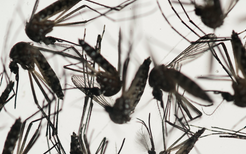Health officials in Dallas announced Tuesday that a resident had contracted the Zika virus, not through a mosquito bite but by sexual transmission.
Two previous cases, one in 2008 and another in 2013, had suggested that Zika could be sexually transmitted, but the Dallas diagnosis marks the clearest evidence yet that Zika can be sexually transmitted.
"This is a game changer," Zachary Thompson, director of the Dallas County Health and Human Services, told television station WFAA.
Previously, at least 30 people in the United States had tested positive for the virus, which now has been found in more than two dozen nations and linked to a rare birth defect that causes newborns' heads to be abnormally small and results in brain damage.
Almost unheard of a few months ago, Zika has dominated headlines across the planet. On Monday, the World Health Organization designated the virus and its suspected complications in newborns as a public-health emergency of international concern, a nearly unprecedented designation that officials hope will rally a global response.
The confirmation that Zika can be sexually transmitted comes on the heels of an October announcement that the deadly Ebola virus could live in a man's sperm for up to nine months, enabling sexual transmission long after a male patient's apparent recovery.
Although very distinct, the two viruses both have injected fear back into sex just as worries over the sexual transmission of HIV appear to be ebbing.
Four months ago, health officials were urging male Ebola survivors in West Africa to use condoms until the virus vanished from their systems. Now, those same officials are asking people in the Americas and elsewhere to practice safe sex lest they contract the Zika virus.
The Centers for Disease Control and Prevention said it will release new guidelines on preventing the sexual transmission of Zika in the coming days, focusing on sexual partners of women who are or who may be pregnant.
"There have been isolated cases of spread through blood transfusion or sexual contact, and that's not very surprising," CDC Director Tom Frieden told CNN. "The virus is in the blood for about a week. How long it would remain in the semen is something that needs to be studied, and we're working on that now."
Frieden stressed, however, that "the vast majority of spread is going to be from mosquitoes" and that "the bottom line is mosquitoes are the real culprit here."
Some, however, cautioned that the Dallas case required more study.
Officials have been keen to point out that Zika is not deadly to adults. Healthy, nonpregnant adults who contract Zika usually encounter symptoms such as fever, pain and itching.
On Wednesday, Florida Gov. Rick Scott declared a health emergency in four counties after at least nine cases of the virus were detected in Florida. State health officials said they believe all of the cases are from people who contracted the disease while traveling to affected countries.
"We have to ensure Florida is prepared and stays ahead of the spread of the Zika virus in our state," Scott said in a statement. "We know that we must be prepared for the worst even as we hope for the best."
Scott signed the order to cover Miami-Dade, Lee, Hillsborough and Santa Rosa counties. That's where all of the affected cases were detected.
The order allows the state's agriculture department to use mosquito spray more in those areas. It also directs the Florida Department of Health to make its own decisions about what's needed from the state and the CDC.
Meanwhile, some scientists caution that as spring and summer approach, warmer weather makes it more likely the mosquitoes can spread the virus.
Nearly everything about the behavior of the Aedes aegypti mosquito -- the one that carries Zika, dengue fever and other diseases -- speeds up in hotter weather, and that affects how quickly it spreads disease, said entomologist Bill Reisen of the University of California, Davis.
"With higher temperatures you have more mosquitoes feeding more frequently and having a greater chance of acquiring infection. And then the virus replicates faster because it's hotter, therefore the mosquitoes can transmit earlier in their life," Reisen said. The thermodynamics of mosquitoes are "driven by temperature."
The hotspots for the Zika outbreak also have been temperature and drought hotspots recently. Recife, Brazil, the largest city in the Zika-struck region, saw its hottest September-October-November on record, about 2.2 degrees Fahrenheit above normal, according to NASA data. The state of Pernambuco had its hottest and driest year since 1998, according to the state weather agency. And globally, last year was the hottest on record.
Information for this article was contributed by Michael E. Miller of The Washington Post and by Seth Borenstein, Mauricio Savarese, Tamara Lush and Gary Fineout of The Associated Press.
A Section on 02/04/2016

